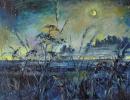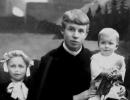Sergei Yesenin - I have only one fun left: Poem. “A bad reputation has spread that I am a bawdy and a brawler.” Sergei Yesenin I got a bad reputation Yesenin
In 1923, Yesenin was at a difficult and, as it turned out later, fatal crossroads for him. The old shirt guy is almost gone, yesterday’s ideals are destroyed, and the look ahead catches emptiness. Many friends have been lost, the conflict with the Soviet regime is growing, and therefore Sergei increasingly writes confessional poetry, trying to draw a line over the past stage of life.
Confession of Yesenin
At this time, “I have only one fun left” is written, which will replenish the golden fund of the poet’s creativity. The confessional poem should open the eyes of those around him to Yesenin’s life and explain to them what was the reason for the not always understandable actions of the poet and man.
And I was obscene and scandalous
To burn brighter.
Burned for you, says Sergei, so why don’t you understand me?
Tired of turning to those around him who do not understand him (this is not Yesenin’s first confessional poem), Sergei remembers God, which is rare for his work.
A Question of Faith
The first line is easily explained - the poet is ashamed that he previously did not believe in God, that he exchanged faith for his own burning. The second line shows that there is no faith today, but this only makes it bitter. Maybe Yesenin wants to become closer to God, but “sins don’t let you into heaven,” maybe he’s just ashamed to go to him because of past sins.
This means that angels lived in it.
Can be classified as autobiographical. Rarely do you come across such an interweaving of angels and devils in any poet - tender lyrics and dashing sprees in taverns, passionate love and frantic hooliganism. So much black and white, light and dark are mixed in Yesenin that an earthly person cannot realize where his truth is.
Repentance?
At the end of the poem, Sergei Yesenin does not beg to forgive him, but asks:
To die under icons.
We don’t know what God said to the poet after his death, but the church allowed him to be buried in a cemetery, which cannot be done with suicides (this is the official version of death). Perhaps this is a gesture with which the church accepted his repentance, but the poet’s admirers do not need to forgive him - he opened their eyes to the Russian soul and is worthy only of applause.
There's only one thing left for me to do:
Fingers in mouth - and a cheerful whistle.
Notoriety has spread
That I am a bawdy and a brawler.
Oh! what a funny loss!
There are many funny losses in life.
I'm ashamed that I believed in God.
It’s sad for me that I don’t believe it now.
Golden, distant distances!
Everything is burned by the death of life.
And I was obscene and scandalous
To burn brighter.
The poet's gift is to caress and scribble,
There is a fatal stamp on it.
White rose with black toad
I wanted to get married on earth.
Let them not come true, let them not come true
These thoughts of rosy days.
But if the devils were nesting in the soul -
This means that angels lived in it.
It's for this fun that it's muddy,
Going with her to another land,
I want at the last minute
Ask those who will be with me -
So that for all my grave sins,
For disbelief in grace
They put me in a Russian shirt
To die under icons.
The poem “I have only one fun left” performed by S. Bezrukov from the film “Sergei Yesenin”.
“I have only one fun left...” Sergei Yesenin
There's only one thing left for me to do:
Fingers in mouth - and a cheerful whistle.
Notoriety has spread
That I am a bawdy and a brawler.Oh! what a funny loss!
There are many funny losses in life.
I'm ashamed that I believed in God.
It’s sad for me that I don’t believe it now.Golden, distant distances!
Everything is burned by the death of life.
And I was obscene and scandalous
To burn brighter.The poet's gift is to caress and scribble,
There is a fatal stamp on it.
White rose with black toad
I wanted to get married on earth.Let them not come true, let them not come true
These thoughts of rosy days.
But if the devils were nesting in the soul -
This means that angels lived in it.It's for this fun that it's muddy,
Going with her to another land,
I want at the last minute
Ask those who will be with me -So that for all my grave sins,
For disbelief in grace
They put me in a Russian shirt
To die under icons.
Analysis of Yesenin’s poem “I have only one fun left...”
Life in Moscow radically changed Sergei Yesenin, who came to the capital as a simple village boy. However, after a few years he felt the taste of freedom and his first literary successes, acquired fashionable clothes and turned into a dandy. However, there was also the other side of the coin - a strong longing for his native village of Konstantinovo, which the young poet tried to drown out with the help of alcohol. Drunken fights, breaking dishes in restaurants, publicly insulting friends and complete strangers - all this became second nature to Yesenin. Having sobered up, he realized that he was behaving disgustingly, but he could no longer and did not want to change anything in his own life. At one of these moments of enlightenment, when the poet was undergoing treatment for alcohol addiction, his famous poem “I have only one fun left ...” was born, which today is known to many as a song included in the repertoire of various performers.
This work was written in 1923, several years before the tragic death of the poet. And between the lines you can read not only words of despair mixed with repentance, but also see that Yesenin considered his mission on this earth to be completed by that time. He really said goodbye to everything that was dear to him and prepared for death, realizing that a life consisting of continuous drunken brawls was not justified in any way. The poet is not embarrassed by the fact that he is a “bawdy and brawler”; moreover, he is indifferent to the opinions of others on this matter. Yesenin is much more concerned about saving his own soul, although he admits that he does not believe in God. Nevertheless, for a person who is ready to cross the last line, it is important to cleanse the soul of everything that has accumulated in it. Therefore, many consider this poem by Yesenin to be his dying confession, which is replete with revelations. Only now the poet repents not before the Almighty, but before ordinary people, submitting himself to the judgment of his readers and not at all counting on leniency. Explaining his behavior, the author notes: “And I was obscene and scandalous in order to burn brighter.” At the same time, the poet regrets that he never managed to “marry a white rose with a black toad... on earth.” The realization that it was impossible to change this world for the better with the help of poetry led Yesenin to despair. Tired of fighting for his ideals, he simply decided to leave everything as it was, asking his loved ones for only one thing - to put him “in a Russian shirt under the icons to die.”
“A bad reputation has spread that I am a bawdy and a brawler.” Sergey YeseninHe went from a cherubic village boy to the most famous rowdy and foul-mouthed man in Russia. At the performances of the blue-eyed shepherd, who read something about the simple joys of rural life, the girls squealed in unison: “Darling Yesenin!” Mayakovsky called the early Yesenin a “decorative peasant”, too sweet, insincere, and his poems - “revived lamp oil”. But “bast shoes and cockerel combs” did not occupy the poet for long. And there was little angelic left in him: he wrote obscene poems on the wall of the Passionate Monastery and, having split the icon, could heat the samovar with it, and could easily light a cigarette from the lamp.
His behavior was invariably found defiant, shocking, and shocking. His poems are a special page of Russian poetry. Yesenin cannot be driven into the narrow framework of literary movements of the early twentieth century; he is on his own, rebellious, passionate, with a huge Russian soul wide open. This is probably why the poetry of Sergei Yesenin leaves no one indifferent: they either adore it or refuse to accept and understand it.
Sergei Yesenin with his sisters Katya and Shura

Yesenin's education
The famous poet could become a teacher: Sergei Yesenin graduated with honors from the Konstantinovsky Zemstvo School in 1909, then entered the church teacher’s school, but after studying for a year and a half, he left it - the teaching profession had little attraction for him. Already in Moscow, in September 1913, Yesenin began to attend the Shanyavsky People's University. A year and a half of university gave Yesenin the foundation of education that he so lacked. Subsequently, the poet educated himself, read a lot and was known for his erudition.
Sergei Yesenin and Anna Izryadnova among the workers of the printing house of the I.D. Sytin Partnership 
The first Moscow muse
When Yesenin arrived in Moscow, he was only seventeen years old. He had one goal: to become the most famous poet in Russia. A year later, he fell madly in love with Anna Izryadnova, who worked with him as a proofreader in a printing house.
From the first days, a civil marriage with Anna seemed to the poet a mistake. At this point, he was more concerned about his career. He left his family and went to seek his fortune in Petrograd. In her memoirs, Izryadnova writes: “I saw him shortly before his death. He came, he said, to say goodbye. When I asked why, he said: “I’m washing away, I’m leaving, I feel bad, I’ll probably die.” I asked him not to spoil him, to take care of his son.”
The fate of Yuri, the son of Sergei and Anna, was tragic: on August 13, 1937, he was shot on charges of preparing to assassinate Stalin.
Yesenin with friends of his youth 
Yesenin and paper
In 1918, the publishing house “Labor Artel of Word Artists” was organized in Moscow. It was organized by Sergei Klychkov, Sergei Yesenin, Andrei Bely, Pyotr Oreshin and Lev Povitsky. I wanted to publish my books, but paper in Moscow was strictly controlled. Yesenin nevertheless volunteered to get the paper.
He put on a long-skirted undershirt, combed his hair in a peasant style and went to see the member on duty of the Presidium of the Moscow Soviet. Yesenin stood in front of him without a hat, began to bow and, diligently cursing, asked “For the sake of Christ, do God’s mercy and release papers for peasant poets.”
For such an important purpose, paper, of course, was found, and the first book of Yesenin’s poems “Radunitsa” was published. "Artel", however, soon disbanded, but managed to publish several books.
Yesenin reads poetry to his mother 
“Being a poet means the same thing as
If the truths of life are not violated,
Scar yourself on your delicate skin,
To caress other people’s souls with the blood of feelings.”
Reading poetry
At the end of 1918, Yesenin lived for several weeks in Tula, fleeing the Moscow famine. Every evening, an educated public gathered in the house where he lived, and Yesenin read his poems, which he remembered by heart - every single one. Yesenin accompanied his recitation with very expressive gestures, which gave his poems additional expressiveness and strength.
Sometimes Yesenin imitated Blok and Bely. He read Blok's poems seriously and with respect, and Bely's poems with mockery, parodying him.
Zinaida Reich 
"Do you remember,
Of course, you all remember
How I stood
Approaching the wall
You walked around the room excitedly
And something sharp
They threw it in my face.
You said:
It's time for us to part
What tormented you
My crazy life
That it's time for you to get down to business,
And my lot is
Roll further down.
Darling!
You didn't love me.
You didn’t know that in the crowd of people
I was like a horse driven into soap,
Spurred by a brave rider."
Beautiful Zinaida
One of the most beautiful women in Yesenin’s life was Zinaida Reich, a famous actress. She was so pretty that the poet simply could not help but propose to her. They got married in 1917, Zinaida gave birth to two children - Tatyana and Konstantin, but Yesenin was never distinguished by fidelity. Reich endured for three years, then they broke up. The most famous poem about her is “Letter to a Woman.”
Sergei Yesenin and imagist Anatoly Mariengof

Yesenin's fears
Sergei Yesenin suffered from syphilophobia - the fear of contracting syphilis. The poet’s friend Anatoly Mariengof said: “It used to be that a pimple the size of a bread crumb would pop up on his nose, and he would walk from mirror to mirror looking stern and gloomy. Once I even went to the library to read the signs of a terrible illness. After that it got even worse, almost like the corolla of Venus!”
But the police caused no less fear in Yesenin. One day, walking with Wolf Ehrlich past the Summer Garden, the poet noticed a law enforcement officer standing at the gate. “He suddenly grabs me by the shoulders so that he himself faces the sunset, and I see his yellowed eyes, full of incomprehensible fear. He breathes heavily and wheezes: “Listen, eh!” Just don't say a word to anyone! I'll tell you the truth! I'm afraid of the police. Understand? I’m afraid!..”,” Ehrlich recalled.
Isadora Duncan and Yesenin 

“Sing, sing. On the damn guitar
Your fingers dance in a semicircle.
I would choke in this frenzy,
My last, only friend.
Don't look at her wrists
And silk flowing from her shoulders.
I was looking for happiness in this woman,
And I accidentally found death.
I didn't know that love is an infection
I didn't know love was a plague.
Came up with a narrowed eye
Made the bully crazy."
Isadora
In the early 20s, Yesenin led an idle life: he drank, made scandals in taverns, and took casual relationships lightly until he met her, the famous American dancer Isadora Duncan. Duncan was 18 years older than the poet, did not know Russian, and Yesenin did not speak English. They got married six months after they met. When they were asked what surname they would choose, both wanted to have a double surname - Duncan-Yesenin. This was written down on the marriage certificate and in their passports. “Now I am Duncan,” Yesenin shouted when they went outside.
This page of Sergei Yesenin’s life is the most chaotic, with endless quarrels and scandals. They diverged and came back together many times, but in the end they were never able to overcome the “mutual understanding.” It is this passion that the poem “Rash, Harmonica!” is dedicated to. Boredom... Boredom...".
Isadora died tragically two years after Yesenin’s death, strangling herself with her own scarf.
Yesenin and Mayakovsky 
“Oh, rash, oh, heat,
Mayakovsky is a mediocrity.
The mug is full of paint,
Robbed Whitman."
Eternal enemies
The myth of mutual hatred between Sergei Yesenin and Vladimir Mayakovsky is one of the most famous literary movements of the 20th century in the history. The poets were indeed irreconcilable ideological opponents and in public speeches they were ready to endlessly throw mud at each other. However, this does not mean that one of them underestimated the strength of the other's talent. Contemporaries confirm that Yesenin understood the significance of Mayakovsky’s work and singled him out from all the futurists: “Whatever you say, you can’t throw Mayakovsky out. It will lie like a log in literature, and many will stumble over it.” The poet repeatedly read excerpts from Mayakovsky’s poems—in particular, he liked the poems about the war “Mother and the Evening Killed by the Germans” and “War Has Been Declared.”
In turn, Mayakovsky also had a high opinion of Yesenin, although he hid it with all possible care. The famous memoirist M. Roizman recalls that once, having come to a reception with the editor of Novy Mir, “I sat in the reception room and heard Mayakovsky loudly praising Yesenin’s poems in the secretariat, and in conclusion said: “Look, not a word to Yesenin about what did I say? The assessment that Mayakovsky gave to Yesenin was unequivocal: “Damn talented!”
Yesenin on the beach in Venice 
Yesenin very accurately noted about himself: “The bad reputation has spread that I am a bawdy and a brawler.” This statement was true, since the poet, in a drunken stupor, loved to entertain the public with compositions of very obscene content. According to the recollections of eyewitnesses, Yesenin almost never wrote down obscene poems; they were born to him spontaneously and were immediately forgotten.
Yesenin had quite a lot of similar momentary poems. For example, his authorship is attributed to the poem “Don’t grieve, dear, and don’t groan,” in which the poet calls on his enemies to go to a well-known address, forestalling their desire to send Yesenin himself to hell.
Sergei Yesenin and Sofia Tolstaya

“Apparently, it’s been this way forever -
By the age of thirty, having gone crazy,
More and more, hardened cripples,
We keep in touch with life.
Honey, I'll soon be thirty,
And the earth becomes dearer to me every day.
That's why my heart began to dream,
That I burn with pink fire.
If it burns, then it burns and burns,
And no wonder in the linden blossom
I took the ring from the parrot -
A sign that we will burn together.
The gypsy woman put that ring on me.
I took it off my hand and gave it to you,
And now, when the barrel organ is sad,
I can’t help but think and be timid.”
Last wife
At the beginning of 1925, Sergei Yesenin met the granddaughter of Leo Tolstoy, Sophia. She was 5 years younger than Yesenin, and the blood of the world’s greatest writer flowed in her veins. Sofya Andreevna was in charge of the library of the Writers' Union. The poet was afraid of her aristocracy until his knees trembled. When they got married, Sophia became an exemplary wife: she took care of his health, prepared his poems for his collected works. And I was absolutely happy. And Yesenin, having met a friend, answered the question: “How is life?” - “I’m preparing a collected works in three volumes and living with an unloved woman.” The unloved Sophia was to become the widow of a scandalous poet.
“Goodbye, my friend, goodbye.
My dear, you are in my chest.
Destined separation
Promises a meeting ahead.
Goodbye, my friend, without a hand, without a word,
Don’t be sad and don’t have sad eyebrows, -
Dying is nothing new in this life,
But life, of course, is not newer.”
Death of poet
On December 28, 1925, Yesenin was found dead in the Leningrad Angleterre Hotel. His last poem, “Goodbye, my friend, goodbye...”, according to Wolf Ehrlich, was given to him the day before: Yesenin complained that there was no ink in the room, and he was forced to write with his own blood.
The mystery of the poet's death still remains unsolved. The official generally accepted version is suicide, but there is an assumption that Yesenin was actually killed for political reasons, and the suicide was only staged.
“You need to live easier”
And yet Yesenin is not a tragic poet. His poems are a hymn to life in all its manifestations. A hymn to a life that is unpredictable, difficult, full of disappointments, but still beautiful. This is the anthem of a hooligan and brawler, an eternal boy and a great sage.
There's only one thing left for me to do:
Fingers in mouth - and a cheerful whistle.
Notoriety has spread
That I am a bawdy and a brawler.
Oh! what a funny loss!
There are many funny losses in life.
I'm ashamed that I believed in God.
It’s sad for me that I don’t believe it now.
Golden, distant distances!
Everything is burned by the death of life.
And I was obscene and scandalous
To burn brighter.
The poet's gift is to caress and scribble,
There is a fatal stamp on it.
White rose with black toad
I wanted to get married on earth.
Let them not come true, let them not come true
These thoughts of rosy days.
But if the devils were nesting in the soul -
This means that angels lived in it.
It's for this fun that it's muddy,
Going with her to another land,
I want at the last minute
Ask those who will be with me -
So that for all my grave sins,
For disbelief in grace
They put me in a Russian shirt
To die under icons.
Analysis of the poem “I have only one fun left” by Yesenin
The last years of Yesenin's life were very difficult. The poet experienced difficulties in his personal life, and his conflict with the Soviet regime grew. The addiction to alcohol became an addiction, for which he was already forced to undergo treatment. Periods of lucidity alternated with severe depression. Paradoxically, at this time he creates beautiful poems. One of them is “I only have one fun left...” (1923).
Yesenin immediately declares his fame as a bawdy and brawler. His violent behavior when drunk was known throughout Moscow. “A cheerful whistle” is typical behavior for a poet who is already at a fairly mature age. But Yesenin doesn’t care at all anymore. He has crossed the line beyond which he can still stop. Having experienced a lot of suffering and failure, the poet lost hope for a better future. Comparing his notoriety to a “ridiculous loss,” he claims that he has lost much more in life.
The only thing that worries Yesenin is shame for his past faith in God. At the same time, he experiences bitterness from the fact that he has become an unbeliever. There is a deep philosophical meaning in this controversial statement. The pure and bright soul of the poet, faced with all the dirt and abomination of the world, could not give a worthy rebuff. Yesenin acted according to the principle: “Living with wolves means howling like a wolf.” But, having sunk to the very bottom, the poet realized that he had lost something very important, helping in life.
Yesenin claims that his crazy antics were aimed at “burning brighter.” A real poet should be visible to the whole world. His creativity is bound to ignite people's hearts. This is the only way to break through human indifference. In order to subtly feel the world around him, the soul of a poet must be full of contradictions. Along with the devils, there are certainly angels there.
Yesenin uses very vivid images to describe his highest calling - the wedding of a “white rose with a black toad.” He believes that he could not combine these completely opposite images, but he strived for this.
The poet's statements about a complete reassessment of his beliefs are known. He became the author of a number of works in which he denies patriarchy and religion and advocates atheism and technological progress. But in the last lines of the poem “I only have one fun left,” it becomes clear what Yesenin hid deep in his soul, carefully kept from other people’s interference. The “hooligan’s” last wish is to die “in a Russian shirt under icons.” In this the poet sees redemption for all his sins.






